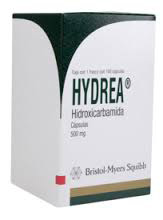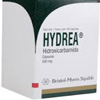  | Hydrea (Hydroxyurea) is used to treat melanoma, chronic myelocytic leukemia, ovarian and primary squamous cell cancer, carcinoma of the head and neck (excluding the lip), chronic myelogenous leukemia, sickle cell anemia. Active Ingredient: Hydroxyurea Availability: In Stock (25 packages) |
| Product name | Per Pill | Savings | Per Pack | Order |
|---|---|---|---|---|
| 30 pills | $2.14 | $64.13 | ADD TO CART | |
| 60 pills | $1.80 | $20.29 | $128.25 $107.96 | ADD TO CART |
| 90 pills | $1.69 | $40.57 | $192.37 $151.80 | ADD TO CART |
| 120 pills | $1.63 | $60.86 | $256.50 $195.64 | ADD TO CART |
| 180 pills | $1.57 | $101.43 | $384.75 $283.32 | ADD TO CART |
| 270 pills | $1.54 | $162.29 | $577.12 $414.83 | ADD TO CART |
| 360 pills | $1.52 | $223.15 | $769.50 $546.35 | ADD TO CART |
INDICATIONS
Hydroxyurea is used to treat skin cancer (melanoma), a cancer of the white blood cells called chronic myelocytic leukemia (CML), and metastatic cancer (cancer that has spread) of the ovaries. This medicine may also be given together with radiation treatment for head and neck cancer (primary squamous cell cancer).
Hydroxyurea is also used in adult patients with sickle cell anemia to prevent painful episodes and reduce the need for blood transfusions. It works by making the red blood cells more flexible.INSTRUCTIONS
Before you begin treatment with hydroxyurea, you and your doctor should talk about the good this medicine will do as well as the risks of using it.
Take this medicine exactly as directed by your doctor. Do not use more of it, do not use it more often, and do not use it for a longer time than your doctor ordered.
This medicine comes with a patient information insert. Read and follow the instructions in the insert carefully. Ask your doctor if you have any questions.
Hydroxyurea should be handled with care and people who are not taking this medicine should be careful to avoid touching it. To decrease the chance of touching the medicine:
Wear disposable gloves when handling hydroxyurea or bottles containing hydroxyurea.
Wash your hands before and after contact with the bottle or capsules.
If powder from the capsule is spilled, you should wipe it up immediately with a damp disposable towel and discard it in a closed container, such as a plastic bag.
You should keep medicine away from children and pets.
You should contact your doctor for instructions on how to dispose of capsules that are past the expiration date.If you miss a dose of this medicine, take it as soon as possible. However, if it is almost time for your next dose, skip the missed dose and go back to your regular dosing schedule. Do not double doses.
DOSAGE
The dose of this medicine will be different for different patients. Follow your doctor's orders or the directions on the label. The following information includes only the average doses of this medicine. If your dose is different, do not change it unless your doctor tells you to do so.
The amount of medicine that you take depends on the strength of the medicine. Also, the number of doses you take each day, the time allowed between doses, and the length of time you take the medicine depend on the medical problem for which you are using the medicine.
For oral dosage form (capsules):
For cancer of the head and neck, ovaries, or skin:- Adults—Dose is based on body weight and must be determined by your doctor. The dose is 80 milligrams (mg) per kilogram (kg) of body weight, taken as a single dose every third day.
- Children—Use and dose must be determined by your doctor.
For chronic myelocytic leukemia (CML):
- Adults—Dose is based on body weight and must be determined by your doctor. The dose is 30 milligrams (mg) per kilogram (kg) of body weight per day, taken as a single dose.
- Children—Use and dose must be determined by your doctor.
For sickle cell anemia:
- Adults—Dose is based on body weight and must be determined by your doctor. The dose is 15 milligrams (mg) per kilogram (kg) of body weight per day, taken as a single dose. Your doctor may increase your dose as needed. However, the dose is usually not more than 35 mg per kg of body weight per day.
- Children—Use and dose must be determined by your doctor.
STORAGE
Store the medicine in a closed container at room temperature, away from heat, moisture, and direct light. Keep from freezing.
Keep out of the reach of children.
Do not keep outdated medicine or medicine no longer needed.
Ask your healthcare professional how you should dispose of any medicine you do not use.SAFETY INFORMATION
It is very important that your doctor check your progress at regular visits to make sure that this medicine is working properly. Blood tests may be needed to check for unwanted effects.
Make sure your doctor knows if you are pregnant before you use this medicine. Using this medicine while you are pregnant can harm your unborn baby. If you think you have become pregnant while using the medicine, tell your doctor right away.
While you are being treated with hydroxyurea, and after you stop using it, do not have any immunizations (vaccines) without your doctor's approval. Hydroxyurea may lower your body's resistance and there is a chance you might get the infection the vaccine is meant to prevent. In addition, other persons living in your household should not get live vaccines (eg, nasal flu vaccine, measles, mumps, or rubella) since there is a chance they could pass the infection on to you. Also, avoid persons who have had a live vaccine. Do not get close to them and do not stay in the same room with them for very long. If you cannot take these precautions, you should consider wearing a protective face mask that covers the nose and mouth.
Hydroxyurea can temporarily lower the number of white blood cells in your blood, increasing the chance of getting an infection. It can also lower the number of platelets, which are necessary for proper blood clotting. If this occurs, there are certain precautions you can take, especially when your blood count is low, to reduce the risk of infection or bleeding:
If you can, avoid people with infections. Check with your doctor immediately if you think you are getting an infection or if you get a fever or chills, cough or hoarseness, lower back or side pain, or painful or difficult urination.- Check with your doctor immediately if you notice any unusual bleeding or bruising; black, tarry stools; blood in the urine or stools; or pinpoint red spots on your skin.
- Be careful when using a regular toothbrush, dental floss, or toothpick. Your medical doctor, dentist, or nurse may recommend other ways to clean your teeth and gums. Check with your medical doctor before having any dental work done.
- Do not touch your eyes or the inside of your nose unless you have just washed your hands and have not touched anything else in the meantime.
- Be careful not to cut yourself when you are using sharp objects such as a safety razor or fingernail or toenail cutters.
Avoid contact sports or other situations where bruising or injury could occur.
Using this medicine for a long time may increase your risk of developing cancer of the blood (leukemia). Talk to your doctor if you have concerns about this risk.
This medicine may cause temporary loss of hair in some people. After treatment has ended, normal hair growth should return, although the new hair may be a slightly different color or texture.
Do not take other medicines unless they have been discussed with your doctor. This includes prescription or nonprescription (over-the-counter [OTC]) medicines and herbal or vitamin supplements.SIDE EFFECTS
Along with its needed effects, a medicine may cause some unwanted effects. Although not all of these side effects may occur, if they do occur they may need medical attention.
Check with your doctor immediately if any of the following side effects occur:
More common- Cough or hoarseness
- fever or chills
- lower back or side pain
- painful or difficult urination
Less common
- Black, tarry stools
- blackening of the fingernails and toenails
- blood in the urine or stools
- pinpoint red spots on the skin
- sores in the mouth and on the lips
- unusual bleeding or bruising
Rare
- Confusion
- convulsions (seizures)
- difficulty with urination
- dizziness
- headache
- joint pain
- seeing, hearing, or feeling things that are not there
- swelling of the feet or lower legs
Incidence not known
- Bleeding under the skin
- blisters on the skin
- bluish or pale color on the skin of the fingers or toes
- coldness of the fingers or toes
- crater-like lesions on the skin
- itching skin
- numbness or tingling of the fingers or toes
- pain in the fingers or toes
- unusual tiredness or weakness
- weight loss
Get emergency help immediately if any of the following symptoms of overdose occur:
- Symptoms of overdose
- Scaling of the skin on the hands and feet
- severe darkening of skin color
- soreness
- sores in the mouth and on the lips
- swelling of the palms and soles of the feet
- violet flushing of the skin
Some side effects may occur that usually do not need medical attention. These side effects may go away during treatment as your body adjusts to the medicine. Also, your health care professional may be able to tell you about ways to prevent or reduce some of these side effects. Check with your health care professional if any of the following side effects continue or are bothersome or if you have any questions about them:
More common:- Diarrhea, drowsiness, loss of appetite, nausea or vomiting.
Less common:
- Constipation, redness of skin at the place of irradiation, skin rash and itching.
Other side effects not listed may also occur in some patients. If you notice any other effects, check with your healthcare professional.
Call your doctor for medical advice about side effects.